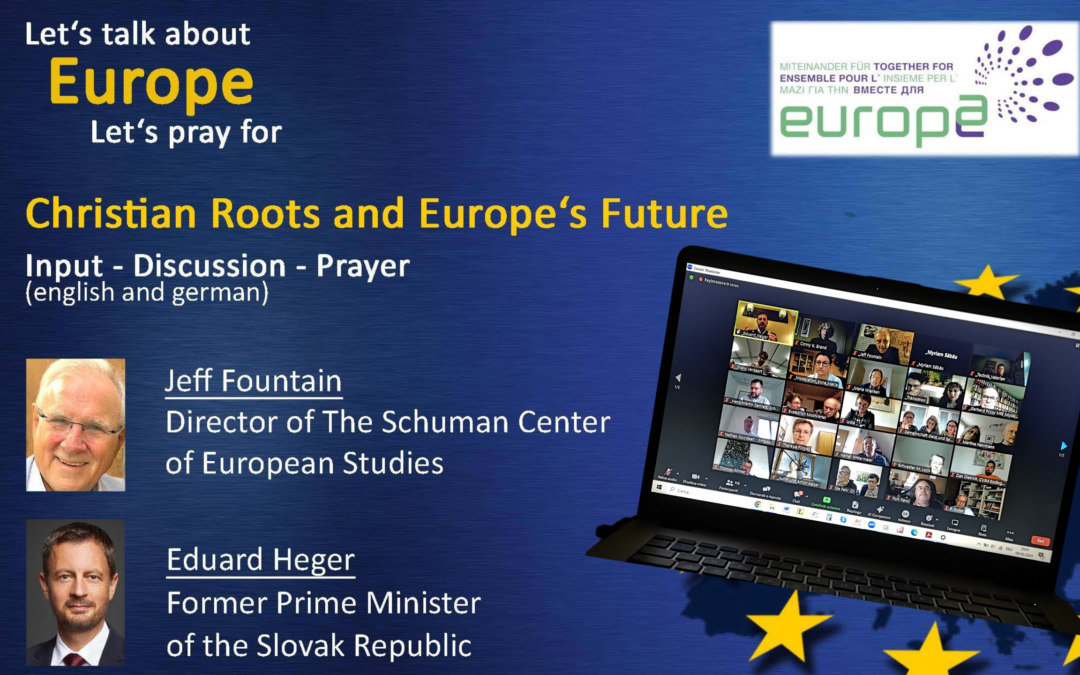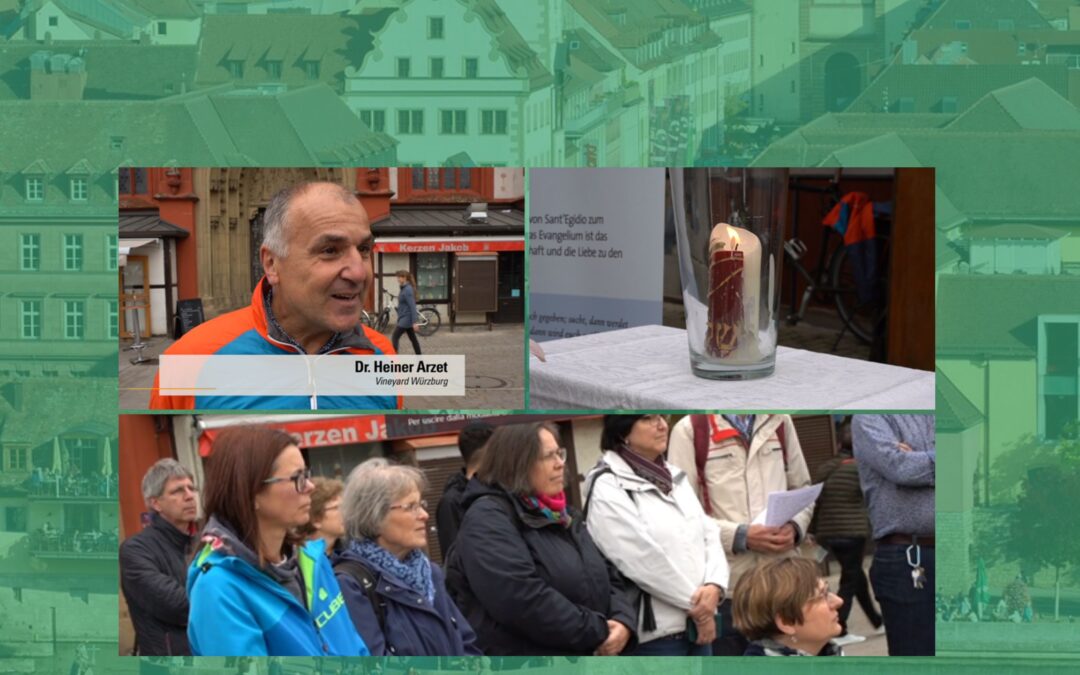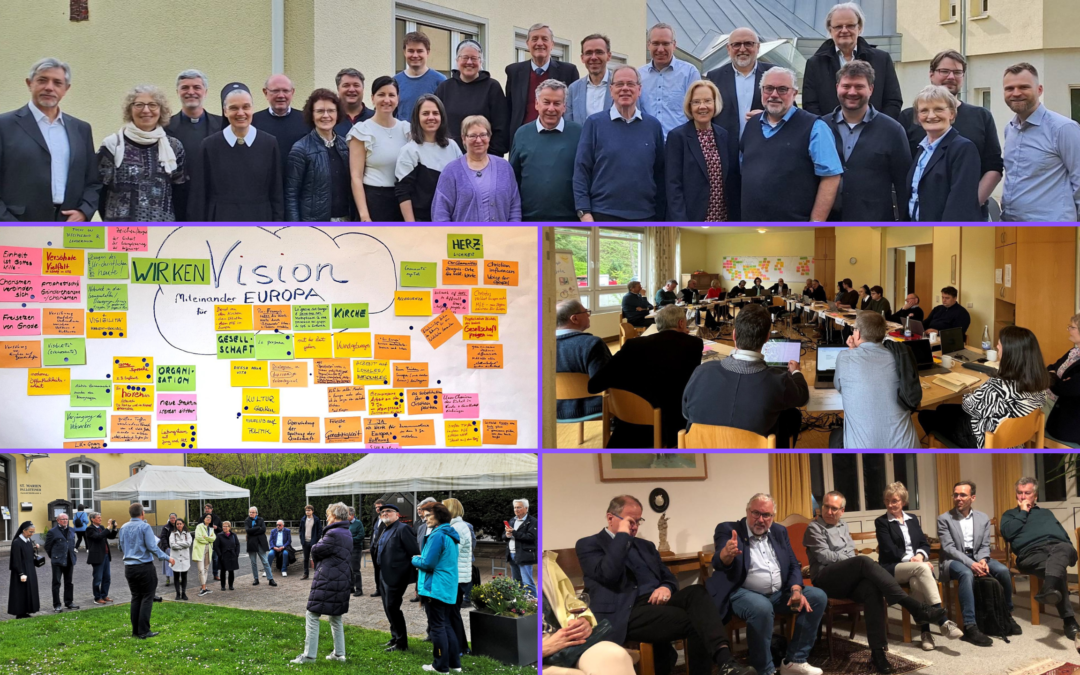
by Beatriz Lauenroth | Jun 11, 2024 | 2024 Europe Day, News
Let’s talk about Europe – Let’s pray for Europe
On 9 May, on the evening of Europe Day 2024, Jeff Fountain, Director of the Schuman Centre for European Studies in Amsterdam, and former Slovak Prime Minister Eduard Heger spoke at an online conference on the topic: Let us speak and pray for Europe. More than 100 participants in Europe followed the keynote speeches with great interest.
The conference was enthusiastically prepared together by a group consisting of members of the YMCA in Esslingen/Germany, ENC in Bratislava/Slovakia and the Focolare Movement in Vienna/Austria.
Jeff Fountain ha discusso nella sua presentazione la storia dell’Europa e le origini della Giornata dell’Europa e ha citato, tra gli altri, l’ateo Richard Dawkins: “Non si può capire l’Europa senza capire il cristianesimo e la Bibbia”. Il 9 maggio 1950, il ministro degli Esteri francese Robert Schuman annunciò l’accordo sul carbone e l’acciaio tra Germania, Italia e Francia con un discorso di soli tre minuti. Adenauer, De Gasperi e Schuman, insieme ai Paesi del Lussemburgo e del Belgio, posero in seguito la prima pietra della Casa Europea dopo la Seconda Guerra Mondiale concretizzando quell’accordo, chiamato CECA. “Questa è la storia che dobbiamo raccontare ai nostri figli e ai figli dei nostri figli ancora e ancora”. Leggi il discorso di Jeff Fountain (inglese) >>
Eduard Heger outlined the problems of our time. To overcome wars, migration, climate change, polarisation and fake news, Heger called on Christians to bring the good news of the Gospel into politics. Heger affirmed: ‘Forgiveness, hope and love can change the world and bring long-desired peace’.
A discussion with the speakers then followed. From the Netherlands: ‘For me, this means that I have to start making peace in my immediate environment. Many small steps then make a big difference’. ‘Unity is strength, that is, connecting with like-minded people to achieve a common goal,’ commented a student from Maastricht.
Beatriz Lauenroth

by Beatriz Lauenroth | May 23, 2024 | 2024 Europe Day, News
In Munich a whole month of celebrations were held to mark Europe Day
In 2024, the city of Munich once again sent out a common message for Europe: there were celebrations around Europe Day for a whole month. This year, the focus was on the European elections scheduled for 9 June. Activities and events were held every day. Munich residents were invited to actively participate, ask questions and be creative.
In this context, on 9 May, Together for Europe – represented by the Focolare Movement and the YMCA on site – took part in the big party in the city centre with a stand in front of the main stage, where singers, various speakers, and musicians alternated throughout the afternoon.
A lot of people came to inquire about our ecumenical network and its activities in Europe. There was time and space to get to know each other, exchange ideas, dreams and even difficulties.
Capturing the attention was a puzzle about the European continent that fascinated mainly children and young people, the generations that will carry Europe into the future.
Beatriz Lauenroth

by Beatriz Lauenroth | May 23, 2024 | 2024 Europe Day, News
In the central square of Würzburg (Germany) people prayed together for peace on 8 May, on the eve of Europe Day 2024. The event was organised by the ecumenical network Together for Europe. In the city, the Movements and Communities involved in this network are, among others, the Community of Sant’Egidio, Vineyard, the Focolare Movement and the YMCA.
The aim of the ecumenical prayer in public was to make known how some of those present were committed to peace in different ways and to encourage those present to do the same: e.g. in the family, at work, in prison, but also on trips.
Dr. Heiner Arzet (Vineyard) told of his trip to Ukraine, where his encounter with psychologically traumatised soldiers in the Butscha military hospital was particularly touching. During the liturgy together with the soldiers, Arzet realised how he too can be an instrument of peace through his presence in prayer.
Each of us, wherever we are, can make small and big choices in favour of peace every day.
Beatriz Lauenroth
See the video clip of the event (German)>>

by Beatriz Lauenroth | May 19, 2024 | 2024 Europe Day, Austria, News
A Europe Day for young and older people was held in Klagenfurt (Austria)
On 8 May, Together for Europe celebrated Europe Day 2024 together with the Carinthia Region and Europahaus. Schools from the region, EU project promoters and representatives of various Movements that form part of the Network participated.
The varied programme included prayers and personal reflections on Europe by the participants.
At the end of the ceremony, a choir of forty pupils sang the well-known melody of the European anthem (9th symphony by Ludwig von Beethoven) in a new version of the text developed by the Lutheran theologian Herwig Sturm. The singing conveyed gratitude, hope and joy to all those who were there.
A day of celebration and encouragement for all generations!
Manfred and Fini Wieser on behalf of the Team TfE in Carinthia

by Beatriz Lauenroth | Apr 17, 2024 | Experiences, reflections and interviews, News
From 11 to 13 April 2024, the European Steering Committee of Together for Europe (TfE) met for its annual retreat in Vallendar, the Schönstatt Centre. 21 members from seven Movements represented on the Steering Committee took part. Among them were: Father Alexandre Awi Mello, Superior General of the Schönstatt Fathers and President of the General Presidium of the International Schönstatt Institution, and Jesús Moran, Co-President of the Focolare Movement, who also attended on behalf of the President, Margaret Karram. The purpose of the retreat was to facilitate and prepare the generational change, as well as to focus on TfE ‘s vision and formulate concrete tasks for the coming years.
Identity
TfE is an ecumenical network with a Steering Committee that is at the service of the various Movements and Communities. The interaction of charisms requires constant listening to the voice of God: “The score is written in heaven” (Chiara Lubich). The nature and mission of TfE are revealed above all through direct participation in the network’s meetings, prayer initiatives, conferences and other local and international initiatives.
A Culture of leadership
Under the expert guidance of the specially appointed external moderator Dr Markus Ressl, and continuously listening to the Holy Spirit, the participants worked out the necessary steps for the near future. Moderator Gerhard Pross (YMCA Esslingen) and General Secretary Diego Goller (Focolare Movement) were given full confidence to continue their service over the next two years. The executive team of the Steering Committee, which previously consisted of four people from different communities, was expanded to include two younger people.
Visibility
To facilitate the work of this team, working and project groups were formed to – among other things – intensify contacts with Eastern Europe, Orthodoxy, Church leaders, politicians and national TfE Teams. In terms of communication, a greater ‘visibility’ in the European public opinion arena is desired.
The voices and suggestions of younger participants are increasingly proving to be an important contribution to a forward-looking collaboration. According to one young participant from the YMCA in Munich, it is above all a ‘personal approach’. “You have to participate in person to understand what it is all about”. In the near future, a group will study the possibility of organising a large event for all Movements.
Impressions
The meeting was characterised by a strong spiritual atmosphere. Fr. Alexandre Awi Mello (Schönstatt) stated: “It touches me deeply to see how God is working in this network. Here we are writing ‘holy history in a holy place’ “. And Jesùs Moran (Focolare Movement):“Charisms are gifts from God to the Churches. TfE allows Europe to see the unity of charisms. There is great potential in this. We must therefore never lose sight of today’s humanity, because we can always give hope to the world thanks to this charismatic force“.
Perspectives
The annual meeting of the Friends of TfE will take place from 31 October to 2 November 2024 in Graz/Seggau under the title ‘Called to Hope’, in close cooperation with the Austrian National Team and with the active participation of the younger generation.
Beatriz Lauenroth





